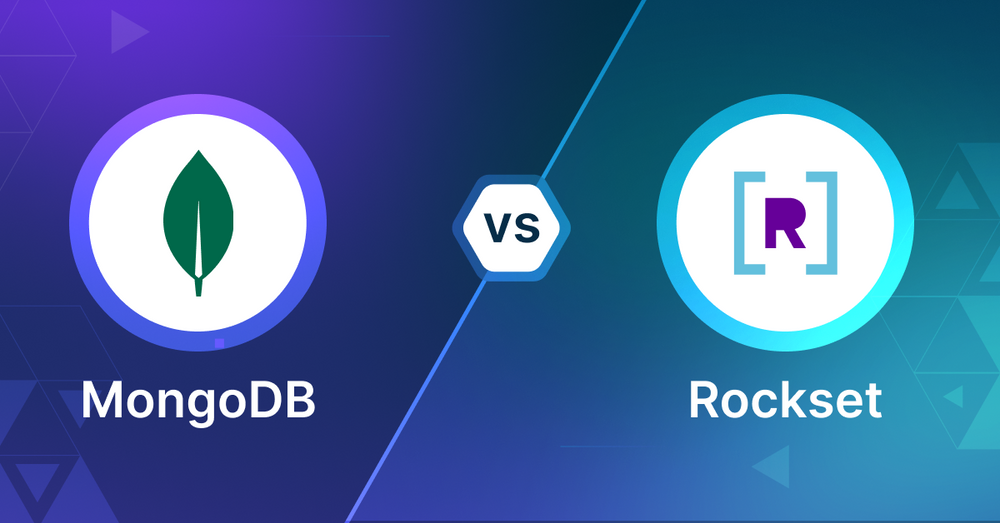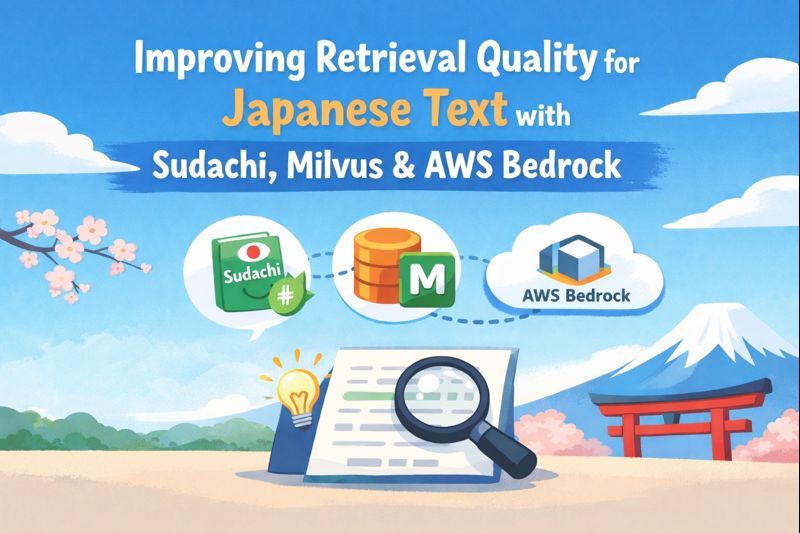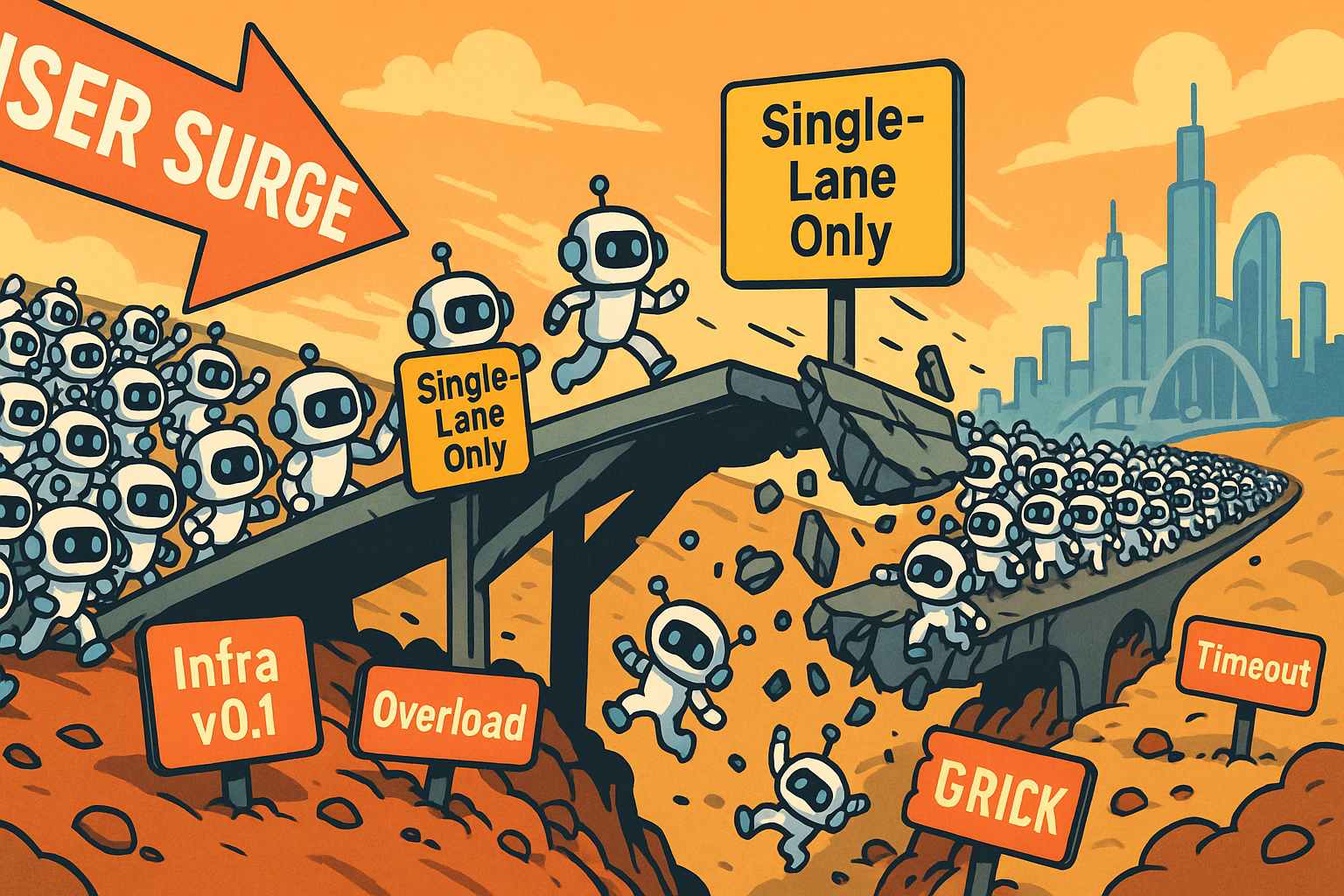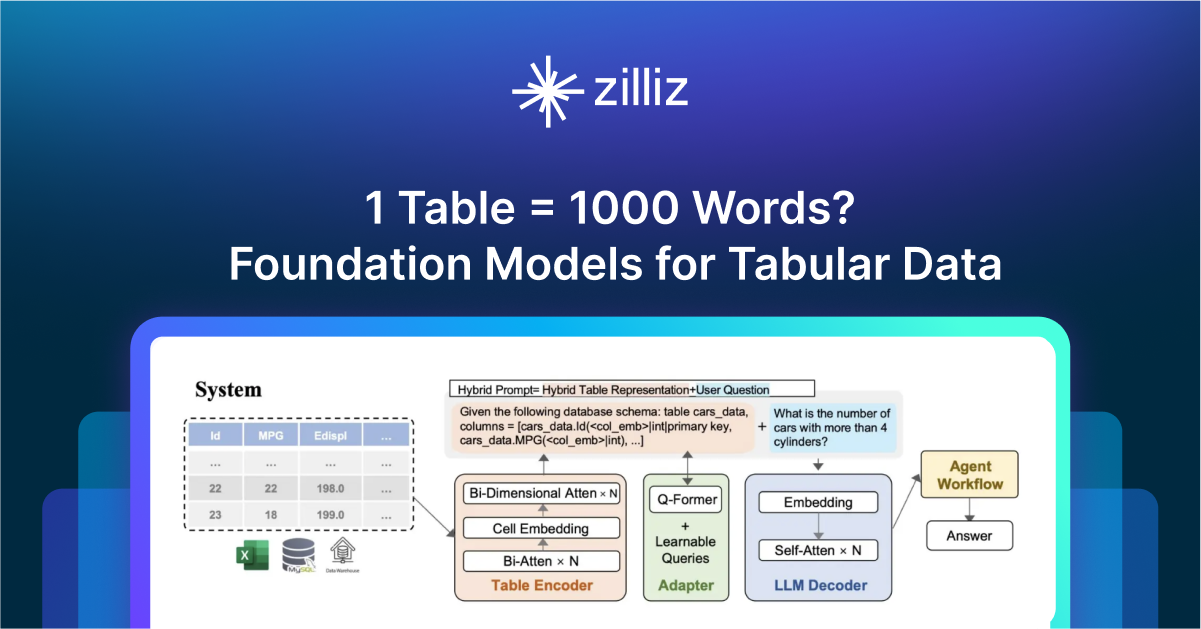MongoDB vs Rockset: Selecting the Right Database for GenAI Applications

As AI-driven applications evolve, the importance of vector search capabilities in supporting these advancements cannot be overstated. This blog post will discuss two prominent databases with vector search capabilities: MongoDB and Rockset. Each provides robust capabilities for handling vector search, an essential feature for applications such as recommendation engines, image retrieval, and semantic search. Our goal is to provide developers and engineers with a clear comparison, aiding in the decision of which database best aligns with their specific requirements.
What is a Vector Database?
Before we compare MongoDB vs Rockset, let's first explore the concept of vector databases.
A vector database is specifically designed to store and query high-dimensional vectors, which are numerical representations of unstructured data. These vectors encode complex information, such as the semantic meaning of text, the visual features of images, or product attributes. By enabling efficient similarity searches, vector databases play a pivotal role in AI applications, allowing for more advanced data analysis and retrieval.
Common use cases for vector databases include e-commerce product recommendations, content discovery platforms, anomaly detection in cybersecurity, medical image analysis, and natural language processing (NLP) tasks. They also play a crucial role in Retrieval Augmented Generation (RAG), a technique that enhances the performance of large language models (LLMs) by providing external knowledge to reduce issues like AI hallucinations.
There are many types of vector databases available in the market, including:
- Purpose-built vector databases such as Milvus, Zilliz Cloud (fully managed Milvus)
- Vector search libraries such as Faiss and Annoy.
- Lightweight vector databases such as Chroma and Milvus Lite.
- Traditional databases with vector search add-ons capable of performing small-scale vector searches.
MongoDB is a NoSQL database and Rockset is a search and analytics database both offer vector search as an add-on. This post compares their vector search capabilities.
MongoDB: The Basics
MongoDB Atlas Vector Search is a feature that allows you to do vector similarity searches on data stored in MongoDB Atlas. You can index and query high-dimensional vector embeddings along with your document data and do AI and machine learning right in the database.
At its core, Atlas Vector Search uses the Hierarchical Navigable Small World (HNSW) algorithm for indexing and searching vector data. This creates a multi-level graph of the vector space so you can do Approximate Nearest Neighbor (ANN) searches. It’s a balance of speed and accuracy for large scale vector search. Atlas Vector Search also supports Exact Nearest Neighbors (ENN) searches which prioritizes accuracy over performance for queries of up to 10,000 documents.
One of the big advantages of Atlas Vector Search is its integration with MongoDB’s flexible document model. You can store vector embeddings along with other document data so you can search more contextually and precisely. You can query any kind of data that can be embedded up to 4096 dimensions. Atlas Vector Search allows you to combine vector similarity searches with traditional document filtering. For example, a semantic search for products could be filtered by category, price range or availability.
Atlas Vector Search also supports hybrid search, combining vector search with full text search for more granular results. This is different from Atlas Search which is focused on keyword based search. The platform integrates with popular AI services and tools so you can use it with embedding models from providers like OpenAI, VoyageAI and many others listed on Hugging Face. It also supports open-source frameworks like LangChain and LlamaIndex for building applications that use Large Language Models (LLMs).
To ensure scalability and performance, MongoDB Atlas provides Search Nodes, which provides dedicated infrastructure for Atlas Search and Vector Search workloads. This allows you to have optimized compute resources and independent scaling of search needs so you get better performance at scale.
By having these capabilities in the MongoDB ecosystem, Atlas Vector Search is a full solution for developers building AI powered applications, recommendation systems or advanced search features. No need for a separate vector database, you can use MongoDB’s scalability and rich features along with vector search.
Rockset: Overview and Core Technology
Rockset is a real-time search and analytics database for structured and unstructured data, including vector embeddings. Its sweet spot is ingesting, indexing and querying data in real-time so it’s great for applications that need up-to-the-second insights. Rockset supports both streaming and bulk data ingestion, can process high velocity event streams and change data capture (CDC) feeds in 1-2 seconds.
One of Rockset’s key features is Converged Indexing built on mutable RocksDB. This allows for in-place updates of vectors and metadata so it’s super efficient for scenarios where data changes frequently. Rockset can handle documents up to 40MB and supports vector dimensionality up to 200,000 so it’s good for a wide range of vector embedding use cases.
Rockset has vector search built into the core. It supports K-Nearest Neighbors (KNN) and Approximate Nearest Neighbors (ANN) search methods and uses a distributed FAISS index for scalability. Rockset is algorithm agnostic, so you can choose your own search implementation. The cost-based optimizer can dynamically choose between KNN and ANN search methods for optimal performance.
What’s unique about Rockset for vector search is the Converged Index which combines search, ANN, columnar and row indexes into one. This means you can handle a wide range of query patterns out of the box. Rockset also supports metadata filtering and hybrid search. The optimizer will choose the most efficient query path. Can search across multiple ANN fields, supports multi-modal models and has both SQL and REST APIs for query interface.
Key Differences
When choosing between MongoDB Atlas Vector Search and Rockset for vector search, you need to know the differences to make an informed decision. Let’s compare these two across several key areas:
Search Methodology
MongoDB Atlas Vector Search uses the Hierarchical Navigable Small World (HNSW) algorithm for indexing and searching vector data. It supports both Approximate Nearest Neighbor (ANN) and Exact Nearest Neighbors (ENN) searches.
Rockset has K-Nearest Neighbors (KNN) and Approximate Nearest Neighbors (ANN) search methods. It has a distributed FAISS index for scalability and is algorithm-agnostic, so you can choose your own search implementation.
Data
MongoDB Atlas Vector Search integrates with MongoDB’s flexible document model so you can store vector embeddings alongside other document data. This means more contextual and precise searching with support for up to 4096 dimensions.
Rockset can handle structured and unstructured data including vector embeddings. It can handle documents up to 40MB and vector dimensionality up to 200,000 so it’s good for many use cases.
Scalability and Performance
MongoDB Atlas has dedicated Search Nodes for Search and Vector Search workloads so you can scale search independently and optimize for performance at scale.
Rockset has a Converged Index that combines search, ANN, columnar and row indexes into one so it can handle many query patterns. It’s designed for real-time ingestion, indexing and querying of data.
Flexibility and Customization
MongoDB Atlas Vector Search allows you to combine vector similarity searches with document filtering and supports hybrid search, combining vector search with full-text search.
Rockset gives you flexibility to choose your own search implementation and supports metadata filtering and hybrid search. Its cost-based optimizer can choose between KNN and ANN search methods for you.
Integration and Ecosystem
MongoDB Atlas Vector Search integrates with popular AI services and tools, supports embedding models from OpenAI and VoyageAI and works with open-source frameworks like LangChain and LlamaIndex.
Rockset has both SQL and REST APIs for querying but the information doesn’t specify the ecosystem integrations.
Ease of Use
MongoDB Atlas Vector Search builds on top of the existing MongoDB ecosystem, so many developers will be familiar with it. It’s a full solution within the MongoDB platform so may simplify the development process.
Rockset’s SQL support makes it more familiar to SQL database users.
Cost
MongoDB has an established ecosystem, lots of documentation and developers are familiar with it. If you’re already using MongoDB, adding vector search might be a no-brainer.
Rockset’s pricing is based on compute and storage. While more flexible, it may require more resource management to optimize costs.
When to Use Each
MongoDB Atlas Vector Search is a good choice when you’re already using MongoDB for your data storage and want to add vector search without introducing a new system. It’s great for applications that need vector search to be seamlessly integrated with document querying, like content recommendation systems or semantic search in e-commerce platforms. You can store vector embeddings alongside other document data so it’s perfect for scenarios where context matters and it supports hybrid search for more granular results.
Rockset is great for use cases that require real-time analytics and search on fast changing data. Its Converged Indexing is perfect for applications that need to ingest, index and query high velocity data streams with low latency. Rockset supports very high dimensional vectors (up to 200,000 dimensions) so it’s good for advanced machine learning applications or complex similarity search scenarios. If your use case involves frequent updates to vector data or requires real-time insights from streaming data sources then Rockset might be the better choice.
Summary
MongoDB Atlas Vector Search uses the strengths of the MongoDB document model and scalability to offer a single platform for both traditional and vector search. It’s integrated with popular AI services and supports hybrid search so it’s a great choice for developers already in the MongoDB ecosystem. Rockset is great for real-time analytics and high dimensional vector search with its unique indexing approach to query fast on fast changing data. The choice between these two ultimately depends on your use case. Consider your existing infrastructure, the nature of your data (static vs. fast changing), the dimensionality of your vector embeddings and the importance of real-time analytics in your application. Both have powerful vector search but their strengths align with different use cases and data handling needs.
Read this to get an overview of MongoDB and Rockset but to evaluate these you need to evaluate based on your use case. One tool that can help with that is VectorDBBench, an open-source benchmarking tool for vector database comparison. In the end, thorough benchmarking with your own datasets and query patterns will be key to making a decision between these two powerful but different approaches to vector search in distributed database systems.
Using Open-source VectorDBBench to Evaluate and Compare Vector Databases on Your Own
VectorDBBench is an open-source benchmarking tool for users who need high-performance data storage and retrieval systems, especially vector databases. This tool allows users to test and compare different vector database systems like Milvus and Zilliz Cloud (the managed Milvus) using their own datasets and find the one that fits their use cases. With VectorDBBench, users can make decisions based on actual vector database performance rather than marketing claims or hearsay.
VectorDBBench is written in Python and licensed under the MIT open-source license, meaning anyone can freely use, modify, and distribute it. The tool is actively maintained by a community of developers committed to improving its features and performance.
Download VectorDBBench from its GitHub repository to reproduce our benchmark results or obtain performance results on your own datasets.
Take a quick look at the performance of mainstream vector databases on the VectorDBBench Leaderboard.
Read the following blogs to learn more about vector database evaluation.
Further Resources about VectorDB, GenAI, and ML
- What is a Vector Database?
- MongoDB: The Basics
- Rockset: Overview and Core Technology
- Key Differences
- When to Use Each
- Summary
- Using Open-source VectorDBBench to Evaluate and Compare Vector Databases on Your Own
- Further Resources about VectorDB, GenAI, and ML
Content
Start Free, Scale Easily
Try the fully-managed vector database built for your GenAI applications.
Try Zilliz Cloud for FreeKeep Reading

How to Improve Retrieval Quality for Japanese Text with Sudachi, Milvus/Zilliz, and AWS Bedrock
Learn how Sudachi normalization and Milvus/Zilliz hybrid search improve Japanese RAG accuracy with BM25 + vector fusion, AWS Bedrock embeddings, and practical code examples.

Build for the Boom: Why AI Agent Startups Should Build Scalable Infrastructure Early
Explore strategies for developing AI agents that can handle rapid growth. Don't let inadequate systems undermine your success during critical breakthrough moments.

1 Table = 1000 Words? Foundation Models for Tabular Data
TableGPT2 automates tabular data insights, overcoming schema variability, while Milvus accelerates vector search for efficient, scalable decision-making.
The Definitive Guide to Choosing a Vector Database
Overwhelmed by all the options? Learn key features to look for & how to evaluate with your own data. Choose with confidence.